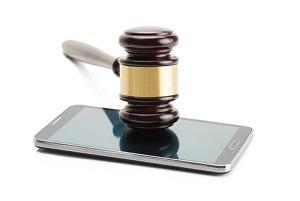 When the police are trying to track down a suspect, they will often stop at nothing to find him or her. In many cases, such determination is understandable, as it is focused on getting a potentially dangerous individual off the street in the interest of public safety as well as enforcing the law. Sometimes, however, law enforcement officials can become overzealous, venturing into territory that risks violating a suspect’s Fourth Amendment rights. With the rise of digital technology, it can be difficult for criminal suspects to even know that their rights have been compromised, but a federal judge in New York recently issued a ruling that could prove to be very important to the future of criminal investigations.
When the police are trying to track down a suspect, they will often stop at nothing to find him or her. In many cases, such determination is understandable, as it is focused on getting a potentially dangerous individual off the street in the interest of public safety as well as enforcing the law. Sometimes, however, law enforcement officials can become overzealous, venturing into territory that risks violating a suspect’s Fourth Amendment rights. With the rise of digital technology, it can be difficult for criminal suspects to even know that their rights have been compromised, but a federal judge in New York recently issued a ruling that could prove to be very important to the future of criminal investigations.
United States v. Lambis
The case in question was the result of a drug investigation by the Drug Enforcement Agency (DEA). According to court records, the DEA legally acquired a suspect’s cell phone information, then obtained a warrant to access cell tower records in an effort to locate the phone. The cell tower data was only able to give DEA agents the general vicinity of the phone. The DEA then employed the use of a cell-site simulator, commonly known as a Stingray, to further track the suspect’s mobile device. The Stingray mimicked a cell tower, gathering information from the man’s phone, leading DEA agents to knock on his door while he slept. A subsequent search of the apartment led to the discovery of cocaine and drug paraphernalia. The man was arrested but sought to have the evidence suppressed based on the manner in which he and the evidence were found.
Crucial Ruling
Earlier this month, Judge William H. Pauley III, a federal judge in the Southern District of New York ruled against the DEA and tossed the evidence against the suspect. In his ruling, Judge Pauley found that the DEA had a warrant for the cell tower information but not to use the more precise—and more invasive—Stingray. He surmised that, based on the DEA’s ability to get the first warrant, the Stingray warrant would likely have been granted if it had been requested, but the agency neglected to do so. “Absent a search warrant,” Pauley wrote, “the Government may not turn a citizen’s cell phone into a tracking device.” He went on to acknowledge that the U.S. Department of Justice has already issued internal policies requiring federal officials to get a warrant before using a Stingray or similar cell-site simulators.
Ultimately, Judge Pauley ruled that the search of the man’s apartment—despite consent being granted by the apartment’s resident—was tainted by the illegal use of the Stingray. The use of the Stingray immediately preceded the search, and no intervening circumstances occurred in between. Agents used the Stingray to find the apartment, they knocked on the door, and obtained consent to search, “thus, the consent was obtained as a direct result of the illegal Fourth Amendment search and was tainted.”
Protect Your Fourth Amendment Rights
If you have been arrested as the result of an illegal search, you need an experienced Hartford criminal defense attorney on your side. Call 860-290-8690 to schedule a confidential consultation at the Woolf & Ross Law Firm, LLC, today. No matter what the charges against you may be, you have certain rights guaranteed by the United State Constitution, and we will work to ensure that they fully protected.
Sources:
http://arstechnica.com/tech-policy/2016/07/for-the-first-time-federal-judge-tosses-evidence-obtained-via-stingray/
http://www.nysd.uscourts.gov/cases/show.php?db=special&id=513
https://www.rt.com/usa/350936-stingray-judge-tracking-warrant/
 50 Founders Plaza
50 Founders Plaza

